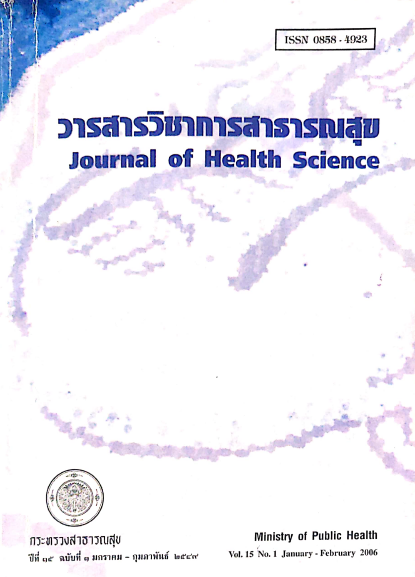Research Series of Thai Health Care Financing: Part 3: Co-Payment in Universal Coverage Scheme : A Policy Analysis
Keywords:
Universal Coverage, co-payment, moral hazardAbstract
Universal Coverage Scheme was launched nation-wide by the government in October 2001. The scheme was financed by general tax revenue with literally free access to contractor primary care unit (PCU) and registered hospitals. A nominal fee (co-payment), 30 baht per visit or per admission, was introduced for UC Pay member (UCP). UC exempted (UCE) members who were the ex-members of Low Income Scheme, the elderly, children under 12 years, monks, war veterans, and village health volunteers were exempted from the co-payment. Current policy debates focused on the appropriateness of co-payment level to deter any unnecessary demand for care as well as capacity to generate some revenue to finance the scheme.
This study examined and classified income quintiles of UCE and UCP members, service utilization rate of UCP, and total revenue generate from co-payment. The study also proposed several scenarios for reform in both directions (termination and increase of co-payment). The 2003 Health and Welfare Survey (HWS) conducted by the National Statistical Office (NSO) was the data set used for the analysis. The analysis had been done during April - May 2004.
There was a substantial portion of the poorest (29%) and the poor (25%) quintiles among UCP members, and a small portion of the rich (9%) and the richest (4%) quintiles among UCE members. Estimated revenue from co pay was probably negligible. This was 1,073 million baht in FY2003 or 1.9 percent of total capitation budget financed by the government. Co-payment was advocated to deter unnecessary demand among users, but this study proposed that it might not be necessary for in-patients (IP) as admissions were clinically indicated under global budget plus DRG payment system. However, co pay might be necessary for ambulatory services as contractors were in weaker positions to contain demand.
It was recommended that any reform of co-payment should be to over-haul the issuance of UCE and UCP to better targeting as a pre-requisite. Co-payment was not a significant resource generation tool to finance UC scheme compared to capitation. Co-payment for IP should be terminated to abolish barrier to health services and prevent patients' welfare loss; there was literally no moral hazard as providers have no incentive to unnecessary admit patients. Finally, co pay should be terminated at HC level in order to advocate use of primary care. In the meantime, research to provide evidence if there was a moral hazard among UC members as well as quantifying the magnitude of moral hazard is needed, prior to major revision of this policy.
Downloads
Downloads
Published
How to Cite
Issue
Section
License
Copyright (c) 2019 Journal of Health Science

This work is licensed under a Creative Commons Attribution-NonCommercial-NoDerivatives 4.0 International License.







